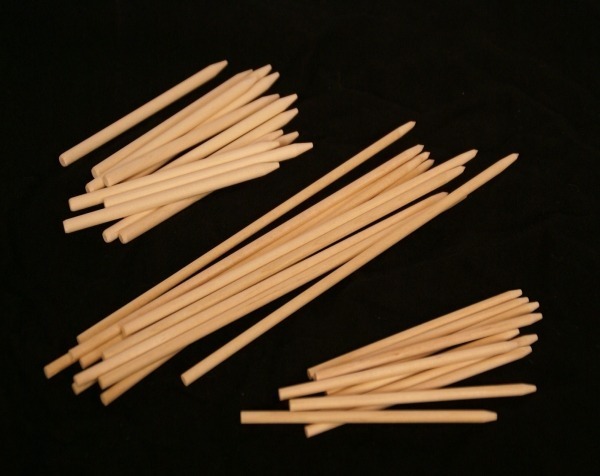Diameter Sizes & Uses
Wood dowels come in a variety of commercially available sizes that range from 1/12” up to 3” in diameter and larger. Small-diameter dowels are produced with different types of equipment based on production efficiency as well as available stock of wood allowing optimal yields. Larger diameter dowels of 1 ¼” and up are typically made from rough-sawn squares run through a single rod dowel machine such as a Hawker-Dayton. Smaller diameters are made on various types of molders using sawn boards and even veneers. Making round shapes from square or rectangular stock generates considerable waste, so yields are closely monitored to produce the most cost-effective product.
When people hear the term wood dowels, they generally think of large-diameter dowels, such as wood handles, broomsticks, banner dowels, and tool handles. Many people don’t realize that smaller diameters are found in interesting and varied applications, particularly in the health and food industries.
Manicure sticks are typically 5/32” in diameter with ends pointed and/or beveled. Originally intended for the cosmetic industry, these have found considerable application in the electronics industry as a non-conductive, heat-resistant tool for assembly and repairs. While often called orangewood sticks, these small-diameter dowels are made almost exclusively from white birch.

Wood Skewers
Another important application of small-diameter pieces is for wooden skewers. Wood skewers are typically produced at diameters from 1/8” – ¼” that range from a couple of inches up to 10” in length for large-scale food processors. The end of a wood skewer is pointed to varying degrees of sharpness depending on the food it must pierce, balanced with safety considerations for the end users. Dense meats require a sharper point than chicken or vegetables. Apple sticks have a blunt point to ensure kids and adults have a safe experience working their way through the caramel or candied coating. Some large-scale producers use automated equipment during their process and packaging, requiring extremely accurate dowel diameters, so as to not jam equipment.
While bamboo has been imported during the past decade, white birch dowel reigns supreme as the wood of choice for skewers and food applications based on its smooth grain that does not splinter and is tasteless. White birch dowels have been used in the food industry for more than a century, having early beginnings in Maine with the production of small-diameter dowels for the lollipop market, long before the development of rolled paper sticks used today.
Smaller diameters are also popular with arts and crafts. As you can see, you can think of the benefits and uses of small-diameter dowels and their place in everyday life!
At H. Arnold Wood Turning, we take pride in creating wood products that meet our customers’ needs and crafting custom wooden pieces that tell a story. Whether you have a production need for wood components in bulk quantities, a vision for a unique woodworking architectural project, or need custom wood parts for manufacturing, please feel free to reach out to us for a free, no-obligation estimate. We bring your ideas to life at competitive prices while making life easy.
